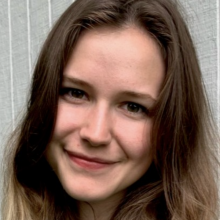
Eliza Haverstock
At the time of this interview, Eliza worked as Assitant Editor, Money & Markets at Forbes. Since, Eliza has worked as a Senior Reporter and Editor for The Org and now works as a Lead Writer on Student Loans for NerdWallet.
Eliza’s Story:
Eliza graduated from UVA in the spring of 2019. She majored in Economics and History. Her first introduction to business news was as an intern for Bloomberg. After graduation, she landed a job in Seattle at Pitchbook, a small tech news startup, where she covered startups, venture capital, private equity, and other finance topics. She has been working at Forbes for the past year as an Assistant Editor on the Money and Markets team. Her job duties involve editing content by freelance writers, fact checking stories for the magazine, and covering stories related to fintech and markets.
Where do you see yourself going next?
I’d like to stay in business news; it’s a cool place. With journalism in general, you get to talk to fascinating people; you get to talk to CEOs, investors, and entrepreneurs all the time. And as a journalist you get access to people like this that you wouldn’t normally get, and you’re always learning— every time I work on a story, I learn something new.
What attracts you to journalism?
I always really liked history and economics, which was why I ended up majoring in them, but I really enjoy writing and researching. I think econ gives you a good handling of quantitative and financial things that people respect. I was thinking of doing journalism for a while— I wrote for The Cav Daily— and then I decided to combine these two things: I’m really interested in business, but I didn’t see myself working in finance. So, that’s how I came to it— it’s a combination of a liberal arts degree, and something more financial or practical like econ. I’m doing a lot of creative things like writing, interviewing people all the time; I’m investigating things. But I’m not doing financial models all the time, I’m just talking about them.
What is a day in the life like for you at Forbes?
Every morning I’ll start by catching up on freelancer posts and editing them, and then I’ll work on longer-term projects. We do a lot of lists at Forbes like 30 under 30, and sometimes I’ll work on longer stories. As a younger reporter, I’ll sometimes be paired with a senior reporter on one of their big investigations, which can be really cool. And sometimes I’ll do a breaking news, or a quick story, if something comes up. I answer and send a lot of emails, and I interview people most days.
Was there someone you interviewed that you thought was really interesting?
Stephen Schwarzman, at my first job. He's the CEO of Blackstone, and he has something like $30B; so, that was a little intimidating. I interviewed the CEO of Playboy magazine; I interviewed a lot of startup CEOs. I interviewed a famous economist, Burton Malkiel. I remember I read his book in one of my econ classes. He wrote A Random Walk Down Wall Street. A few months ago, I interviewed UVA alum and Reddit founder Alexis Ohanian about his venture capital fund. It was a blast and he made a lot of UVA jokes.
Do you have any advice or tips for economics majors who want to pursue journalism? Is there anything you think they should be doing now?
I would say if you want to cover anything like business or anything financial, it's awesome that you're studying econ. It equips you with the tools to ask the right questions. I think it's important to get started in journalism in general to have what are called clips, which are writing samples— ideally articles. Writing for The Cav Daily is an awesome way to do that. I would write a couple articles a week, and that was great experience and practice, or even if you have an internship where you can write and publish something online.
I think asking a lot of questions is good. When I was trying to decide if business journalism was a good route for me, I went on LinkedIn and you can search alumni of your school, and you can search certain companies. I would sort it so I saw a UVA alum who worked at The Wall Street Journal, or who worked at Bloomberg or Forbes, and I would send them a message. People love to help young people who went to their school. I would ask them questions like 'what's a day in the life like?' Or 'what would you tell a younger version of yourself?' Just asking for career tips - those are great because it was a way to establish connections, and then they may remember you down the line, or you could reach out to them again later.
Do you have any tips for conducting interviews?
It’s definitely an art. Generally, you want to ask open-ended questions. Don't ask yes or no questions. Don't be afraid to ask the same question over again to get a better quote. Sometimes I'll talk to a financial expert that's talking in jargon the whole time because that's her life, and I'll ask 'Can you break that down in simple terms,' because you want to make things understandable to the reader, and it helps you learn too. And I always like to ask at the end of the interview, 'Is there any question you think I should've asked,' or 'Is there anything I should be paying attention to as a journalist?' I also work with great editors, and they’ll give me feedback and suggestions on interview questions.
